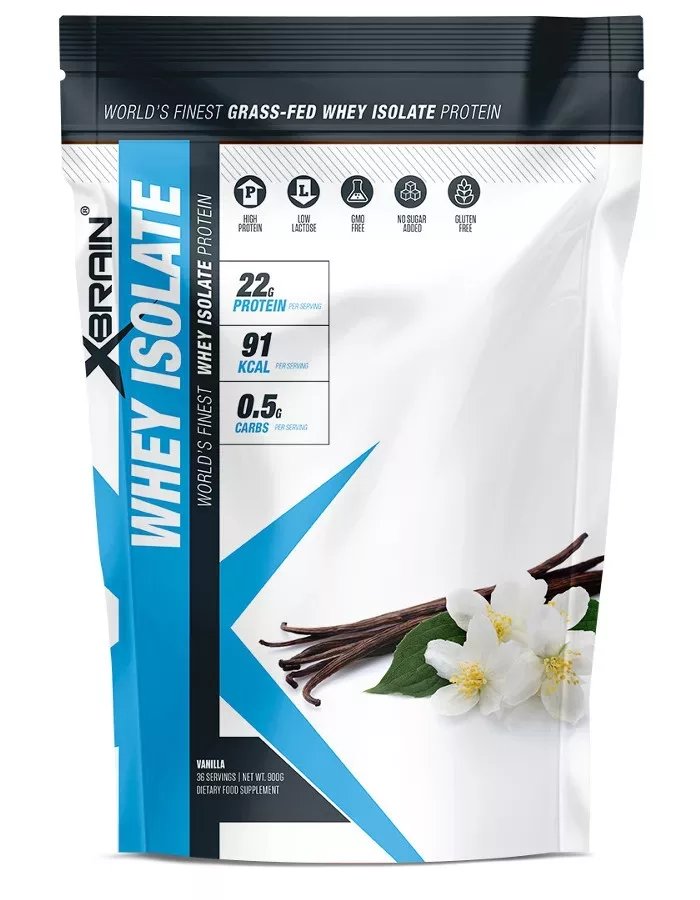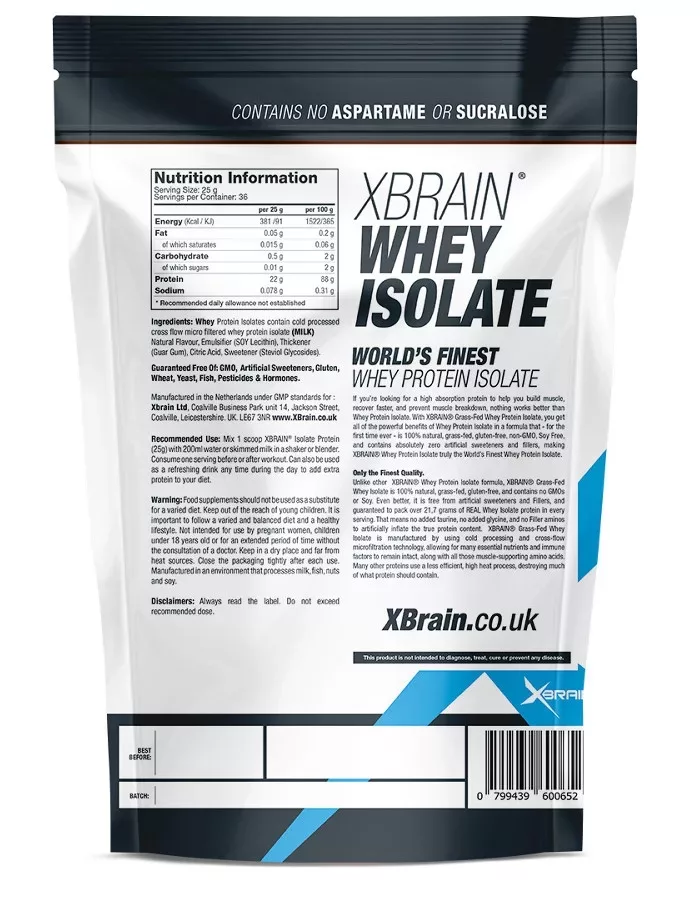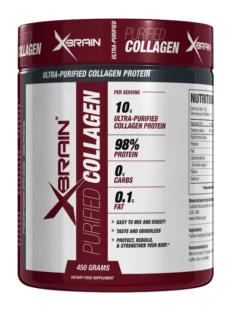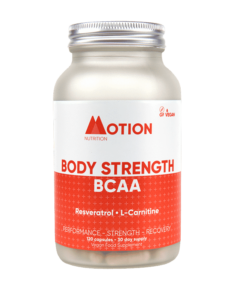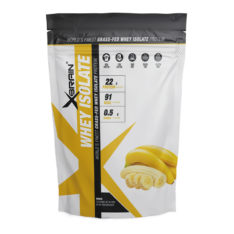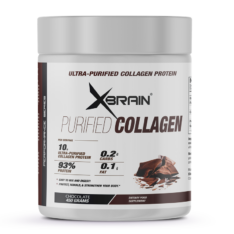Description
Worlds finest XBRAIN® Whey Isolate Vanilla
XBRAIN® Whey Protein Isolate delivers all of the advantages of whey protein and it’s 100% natural, gluten-free, and non-GMO. contains absolutely zero artificial sweeteners and fillers. Made with milk from grass fed cows, XBRAIN® Whey Protein Isolate contains zero additives or fillers making it the finest whey protein formula out there.
Whey Isolate Vanilla Only the Finest Quality
When it comes to quality, many whey isolate products fall short of the mark, but XBRAIN® Whey Protein Isolate is 100% natural, gluten-free, and contains no GMOs. Unlike other whey isolate protein mixes, XBrain’s world class formula is completely free from artificial sweeteners and fillers, guaranteed to pack over 20,7 grams of REAL Whey Isolate protein per helping. This means a formula with absolutely no added taurine, no added glycine, and no filler aminos commonly used in other mixes to artificially enhance the actual protein content.
XBRAIN® Whey Isolate Vanilla only uses cold processing and cross-flow microfiltration technology, procedures that allow the nutrients and immune factors of the whey protein to stay intact, as well as muscle-supporting amino acids. Most other producers of whey protein use a much less efficient, high heat process which damages the protein and reduces the overall quality.
Importance of Grass-Fed Cows
The milk used to make your whey protein isolate is only as good as the cow that it came from. Cows have a unique digestive system that works in a different way to humans because they graze continuously. Throughout the course of history, their bodies have evolved to digest vegetation that’s rich in nutrients. Grass is rich in cellulose which can be troublesome to animal digestion – even for herbivores so, they chew the grass for a long time before it goes to the rumen (this is the first section of a cow’s stomach). It’s in this compartment that fermentation takes place as it contains a salty solution and bacteria that breaks down the grass. This semi-digested grass, or cud is regurgitated by the cow who then chews it further before swallowing it down again. When the cud is sufficiently chewed and broken down, it passes to the true stomach where further digestion occurs. This fermentation process is important to maintain healthy digestion and produce high-quality, protein-rich milk.
Across the world, farmers are moving away from traditional farming methods such as open grazing due to its cost. It is much cheaper to keep cows in communal feedlots giving them corn, hay, barley, soybeans and fat, the digestion of which requires acids that are potentially harmful to the cows’ stomachs and livers. Prolonged confinement to feedlots combined with unhealthy diets increases the chance of disease meaning that the cows require antibiotics to fight off disease. The average lifespan of these cows is 4 years before liver damage takes its toll and they are killed for their meat. Such cows have a reduced quality of life and produce far inferior milk. The breeding of unhealthy cows results in their produce lacking in omega-3 fatty acids, vitamin Bs, essential amino acids and minerals.
The 9 reasons to choose grass-fed Whey Protein Isolate Vanilla
If you’re choosing a new whey protein isolate formula, it is important to make sure the product is sourced from grass-fed cows. Listed below are 9 reasons why whey protein from grass-fed cows should be the only option:
1.Antibiotics
Feedlot cows require antibiotics to protect against diseases and other health problems associated with poor diet and unsanitary living conditions. The overuse of antibiotics results in resistant bacteria which, when passing into cows’ milk, can pose a threat to human health. Grass-fed cows consume natural foods (grass and humus) which keeps them healthy, no antibiotics required.
2.Growth Hormone
Growth hormones are given to cows to increase their size and yield but this makes them weaker and more prone to diseases leading to inferior produce. These hormones and other chemicals can be passed on to humans when products from cows that have been given growth hormones are eaten. Using milk from grass-fed cows that are completely hormone-free makes high-quality whey protein.
3.Minerals
Feedlot cows’ milk generally has a lower mineral content so minerals such as calcium, phosphorus, magnesium and potassium are less abundant. Grass-fed cows’ milk contains larger amounts of healthy minerals.
4.Amino Acids
Cows that are bred in feedlots are often lacking in essential amino acids causing them to produce milk of an inferior quality. Grass-fed cows contain all 9 essential amino acids and more which helps to build lean muscle.
5.Conjugated Linoleic Acid
Grass-fed cows’ milk contains up to 5 times more CLA (conjugated linoleic acid) than milk from feedlot cows. Research into CLA has shown that it can provide a defense against cancer, cardiovascular disease, high blood pressure, osteoporosis, high cholesterol, inflammation and is good for weight management. CLA is an essential fatty acid so it is necessary for a healthy diet. One of our best sources of CLA is from grass-fed cows.
6.GMOs
Feedlot cows will generally eat genetically modified corn and soy. These foods are genetically engineered with harmful pesticides which produce toxins that can eventually pass onto humans. The milk used in grass-fed whey protein comes fro cows with a natural diet of grass which is not a GMO.
7.Toxic Metals
Inferior whey proteins are made with less efficient processing techniques and can be exposed to solvents and other toxins. Consuming whey that has been processed this way can lead to heavy metal poisoning. Manufacturers using high quality grass-fed cows’ milk use responsible methods when processing the whey.
8.Overall Health
High-quality whey protein derived from grass-fed cows has multiple health benefits. It is important for nutrient absorption, detoxification and maintaining healthy intestinal otflora.
9.Taste
Grass-fed whey tastes delicious and has a much smoother texture than inferior, cheaper whey protein mixes
To Sum it Up
Whey is one of two protein groups found in cow’s milk which constitutes 20 percent and casein is the other protein group which makes up about 80 percent of the protein content. Whey as a group of proteins is the fraction that separates out during cheese making. This fraction is purified to different concentrations depending on the end-product desired and varies in protein, lactose, immunoglobulins, minerals and fat content. Of all protein sources, whey has the highest digestibility and bioavailability It contains the full spectrum of essential amino acids including branched-chain amino acids (BCAA). Leucine, a BCAA, is important for stimulating the mTOR pathway and initiating protein synthesis and cellular uptake of amino acids. It plays a critical role in muscle building and glucose metabolism. Whey contains a fair amount of the amino acid cysteine which is important for making glutathione. Glutathione is a cofactor to many peroxidase enzymes and is a powerful antioxidant and detoxifier.
Grass-fed whey like XBrain Whey Protein is far superior to processed whey. Grass-fed whey starts with the highest quality milk with limited processing. This supplies the correct ratio of nutrients to supply all your needs. Grass-fed whey contains more glycomacropeptides, alpha-lactalbumen, immunoglobulins and lactoferrin.
Suggested Reading:
Whey Protein
International Society of Sports Nutrition position stand: protein and exercise
http://www.jissn.com/content/4/1/8
Resource Library – Milk Composition & Synthesis. (n.d.). Animal Sciences Classes. Retrieved March 29, 2013, from http://classes.ansci.illinois.edu/ansc438/m
Solutions, N. B. (n.d.). PRINCIPALS OF DAIRY CHEMISTRY. NEM Business Solutions Specialist in food industry CIP systems. Retrieved March 29, 2013, from http://www.cip.ukcentre.com/chem1.htm
Bishop, R. (n.d.). Dairy Proteins.Wisconsin Center for Dairy Research and the Wisconsin Milk Marketing Board,. Retrieved March 31, 2013, from www.cdr.wisc.edu/programs/dairyingredie
Rodriguez NR, Vislocky LM, Gaine PC. Dietary protein, endurance exercise, and human skeletal-muscle protein turnover. Curr Opin Clin Nutr Metab Care. 2007 Jan;10(1):40-5
Frestedt JL, Zenk JL, Kuskowski MA, Ward LS, Bastian ED. A whey-protein supplement increases fat loss and spares lean muscle in obese subjects: a randomized human clinical study. Nutr Metab (Lond). 2008 Mar 27;5:8. doi: 10.1186/1743-7075-5-8. PubMed PMID: 18371214; PubMed Central PMCID: PMC2289832.
Martin CJ, Robison R. The Minimum Nitrogen Expenditure of Man and the Biological value of various Proteins for Human Nutrition. Biochem J. 1922;16(3):407-47. PubMed PMID: 16743096; PubMed Central PMCID: PMC1259089.
BV of Protein Sources. N.d. NA, Online. Cut and Jacked. Web. 1 Apr. 2013.
L-leucine availability regulates phosphatidylinositol 3-kinase, p70 S6 kinase and glycogen synthase kinase-3 activity in L6 muscle cells: evidence for the involvement of the mammalian target of rapamycin (mTOR) pathway in the L-leucine-induced up-regulation of system A amino acid transport.

